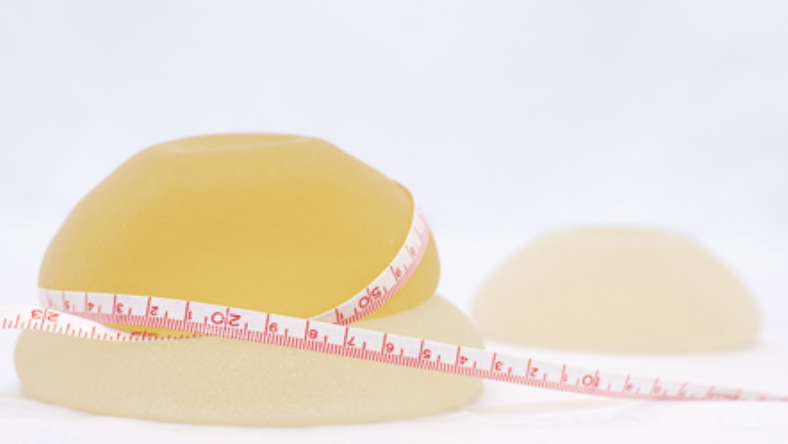Blog
Study Examines Injectable Gel for Breast Enhancement
A new study assesses the safety and efficacy of an injectable gel for breast enhancement as a non-surgical alternative to breast augmentation. Published in Plastic and Reconstructive Surgery journal, the study used the hyaluronic acid-based gel Macrolane to add volume to breasts.
Macrolane by Q-Med, the makers of Restylane, is a gel that adds volume to tissues and can be used for restoring and enhancing body contours or for filling concave deformities and scars. It provides results without open surgery, and the scarring at the injection site is minor and is likely to become less noticeable with time, according to Q-Med.
While not yet approved in the U.S., currently Macrolane is used in Europe, and it has been “well established for use in aesthetic facial procedures” according to the study. A new formulation may make it suitable for breast enhancement as well.
The study was conducted in Sweden with twenty women who received injections of the gel under local anesthesia. The study found high subject improvement rates for breast appearance (83 percent) at 6 months post-treatment. A year after treatment, 69 percent of breasts were still considered improved. The decline in satisfaction after 12 months is related to the fact that results with the gel are not permanent, so those looking for permanent enhancement may be better off considering traditional surgical enhancement with breast implants.
The highest levels of satisfaction were observed in relation to the shape and general appearance of the breast, although comparable trends were also noted for size and firmness, the study said.
The researchers concluded that the “gel is a new option for the patient population who desire aesthetic improvement of the breast but who do not want to undergo surgery.” They also wrote that further studies with larger numbers of patients are warranted.
Women Share Their Experiences on Breast Augmentation Forums
 Deciding to undergo breast augmentation may not be a simple decision, as there are many variables for the patient to think about, such implant type and size. A new study found that women find emotional support and build relationships with other patients through online forums.
Deciding to undergo breast augmentation may not be a simple decision, as there are many variables for the patient to think about, such implant type and size. A new study found that women find emotional support and build relationships with other patients through online forums.
Overall the breast augmentation forums are a positive experience for women, according to the study. “Through electronic postings, they cared for and nursed each others’ anxiety and feelings throughout the whole process,” wrote the researchers at Oslo University Hospital.
Online forums have made it easier for patients to connect and communicate with others interested in breast augmentation. The researchers suggested that for women who are looking for information on the procedure, the Internet “is one of the most important or perhaps the most important, source of knowledge on the topic.”
The women used forums and message boards to share information and experiences on breast augmentation and to examine their reasons for choosing the procedure.
The message boards are also a place for getting support and building relationships as well. “The most profound element of the forum culture was the provision of support to other women,” the researchers wrote. “By sharing and exchanging thoughts, the women nursed each other in terms of their doubts, bitterness, pain, sadness, excitement, elation, and happiness.”
The study found the forums offered women support throughout the process. For instance, before surgery women discussed how they were making decisions with regard to implant size, profile, shape, placement and material. After surgery, discussions included their experiences with soreness, swelling, pain and postoperative self-care.
Women on the message boards also discussed relationships with their self-image and their surgeons.
The researchers located the online forum they studied using Google. Here are a few popular breast augmentation forums:
Learn more about breast augmentation in Maryland.
5 Ways to Evaluate Your Cosmetic Surgeon Before Breast Augmentation
There are more than a few surgeons offering breast augmentation in Maryland,  but not every one will help you achieve the cosmetic outcomes you desire.
but not every one will help you achieve the cosmetic outcomes you desire.
If you are like the patients we see in Frederick county, you want good results the first time and you want a generally comfortable and positive experience.
Asking these 5 questions may help you achieve those goals.
1. Has your surgeon been through training specific for breast augmentation, and is he or she versatile enough to provide many options in breast augmentation?
Because some skills overlap, you might find different surgeons doing the same procedure. For example, you might see an ENT surgeon or an oral surgeon for rhinoplasty. Breast augmentation however, is very specific to plastic and cosmetic surgery. Cosmetic surgeons perform breast augmentation as a primary part of their surgical residency, and should therefore have a greater aptitude in a variety of techniques that can meet your needs.
2. Who will administer anesthesia during the procedure?
Anesthesia is considered safe with a trained practitioner, but in the wrong hands it can pose a pretty serious risk. Whoever administers anesthesia for you should be well trained, prepared for unexpected problems, and focused on your safety.
3. Who will guide you through surgery and oversee your recovery?
Although your cosmetic surgeon should be accessible and responsible for you, it is very common for the supporting staff to oversee much of the operation and assist patients through the process. Doing this is vital to both the success of the surgery and to the overall experience. Read more about our talented staff in Urbana.
4. Does your surgeon have privileges at a local hospital?
To perform breast augmentation at a hospital, the surgeon must prove or demonstrate a record of training for that field. If surgery isn’t done in a hospital, it will likely be in an outpatient surgical suite or surgery center. Read about Dr. Will’s hospital affiliations here.
5. Is the surgical facility accredited and safe?
Breast augmentation can be performed in a hospital or outpatient surgery center. To receive proper accreditation in a surgical facility specific standards must be met. See pictures of our location and surgical facility here.
Breast Surgery Could be Key to Advancing the Field of Regenerative Medicine
An article in the latest issue of Wired magazine reports on how a biotech company is using breast surgery to advance the field of regenerative medicine. Cytori Therapeutics is trying to use stem cells from fat to help the body rebuild itself, and the firm’s CEO Chris Calhoun says they have figured out a way to augment breasts using stem cell–enriched fat tissue.
Cytori’s process for breast augmentation or breast reconstruction involves using liposuction to get fat cells (usually from the abdomen) from the patient. Next the fat is injected into the company’s Celution System where a centrifuge separates the fat cells from the stem and regenerative cells and prepares the cells for injection. Finally, a surgeon injects the cells into the breast for the augmentation or reconstructive procedure.
The cells don’t become breast tissue; rather, the fat cells in the mixture provide volume and the regenerative cells encourage the growth of a blood supply that the fat cells need to survive.
Cytori is focusing its technology on breasts because breasts don’t have much function beyond nursing a baby. According to the article: “The scientific and regulatory hurdles to getting Cytori’s cells into clinical use will be easier to clear for breasts than for other tissue: Breasts simply aren’t as necessary as other organs, so the bar for proving to regulators that the technology works will be lower.”
The company has completed almost a decade of trials on cell cultures, lab rodents and now humans. Cytori believes the same technology it is using for breast procedures could be used to regenerate other damaged tissue, such as in the heart or kidneys.
Cytori’s system has not yet received FDA approval, so it can’t be marketed in the U.S. (although doctors can purchase it).
Choosing Between Silicone & Saline Breast Implants
A poll at www.implantinfo.com found that women interested in breast augmentation are more likely to want silicone vs. saline breast implants. Of the 481 women who responded that they were planning to get breast augmentation surgery, 58 percent said they would choose silicone breast implants, 24 percent said they would choose saline breast implants, and 17 percent were undecided.
Statistics from the American Society of Plastic Surgeons (ASPS) show a a more even split. In 2009, half of the women who received breast implants in the U.S. got silicone implants and half saline. The year before, ASPS data shows that 53 percent got saline implants and 47 percent chose silicone.
All breast implants are made out of a silicone outer shell; the difference between implants is what they are filled with.
Saline Breast Implants
Saline breast implants, available to women 18 and older for breast augmentation, are filled with saline, usually at the time of surgery. Some women find that saline implants do not have a natural look and feel and that silicone mimics this more effectively.
One of the advantages of saline is that the surgeon can fill the implant during surgery, which allows for a smaller incision. Another advantage is that the size of saline implants can be altered over time. Saline implants feature small valves in which a doctor can insert a needle and either add or subtract the liquid.
Silicone Breast Implants
Silicone breast implants, available to women 22 and older for breast augmentation, are pre-filled with silicone gel. The gel is a thick, sticky fluid that closely mimics the feel of human fat. Many women feel that silicone breast implants look and feel more like natural breast tissue. Unlike with saline implants, the size of silicone implants can’t be altered without changing the implant during an operation.
Dr. Will offers both types of implants for breast augmentation, and he can help you decide which type of implant will work best. Browse his photo gallery for before and after photos of breast augmentation patients.
HOW BREAST AUGMENTATION CONTINUES TO RANK AT NUMBER 1

Since 2006, no other cosmetic procedure has been more popular than breast augmentation. What are the secrets to its success?
Continue reading “HOW BREAST AUGMENTATION CONTINUES TO RANK AT NUMBER 1” »
10 Facts You May Not Know About Your Breasts

Just how much do you know about your breasts? You may be surprised by some of these facts about all things breasts, from bra sizes to breast implants.
Continue reading “10 Facts You May Not Know About Your Breasts” »
3 KEY TIPS FOR A SAFE BREAST AUGMENTATION

Last year, there was one procedure that overthrew liposuction as the most popular cosmetic surgery in the United States – breast augmentation. Continuing to receive rave reviews by the growing list of past patients, it is still essential for women considering breast implants to follow these three tips to ensure peace of mind before, during and after your breast surgery.
Continue reading “3 KEY TIPS FOR A SAFE BREAST AUGMENTATION” »
Breast Augmentation 101: Implants

Have you been thinking about breast augmentation? Here’s everything you need to know about the implants used in today’s enhancement procedures.
Continue reading “Breast Augmentation 101: Implants” »
Study Finds Obese More Likely to Experience Breast Surgery Complications
New research shows that obese people who undergo breast surgery may be 12 times more likely to suffer from breast surgery complications. It is estimated that a third of adults in the United States are obese.
Johns Hopkins University researchers examined insurance claims of 2,403 obese patients and 5,597 normal weight patients who had breast procedures, including breast lifts, breast reductions and breast augmentations, between 2002 and 2006.
Just over 18 percent of the obese group had at least one complication within 30 days of surgery, compared to only 2.2 percent of non-obese patients.
It found that obese patients were 22 times more likely to have inflammation; 13 times more likely to develop infection; and 11 times more likely to experience pain.
Breast reduction was the most common procedure for patients in the study, accounting for 80.7% of surgeries in the obese group and 63.8% in the non-obese group. Next was breast reconstruction, followed by breast augmentation and breast lift.
Individual breast procedures all had higher complication rates for obese patients, and complications were most common with breast augmentation among obese patients, with half of obese patients experiencing complications.
Complication rates for each breast procedure were as follows:
- Breast augmentation – 50.5% among obese and 4.4% among non-obese
- Breast lift – 24.1% among obese and 11.4% among non-obese
- Breast lift with augmentation – 38.9% among obese and 5.6% among non-obese
- Breast reconstruction – 29.4% among obese and 1.8% among non-obese
- Breast reduction – 14.6% among obese and 1.7% among non-obese
Based on their findings, the researchers recommended that patients should be informed about the risk of obesity prior to breast surgery procedures. According to the authors, the reasons for the higher risk of complications with obesity may be greater space for infection to set in from larger surgical wounds and slower healing due to poorer blood flow in fat tissue than in other types of tissue.

 Deciding to undergo
Deciding to undergo  but not every one will help you achieve the cosmetic outcomes you desire.
but not every one will help you achieve the cosmetic outcomes you desire.












